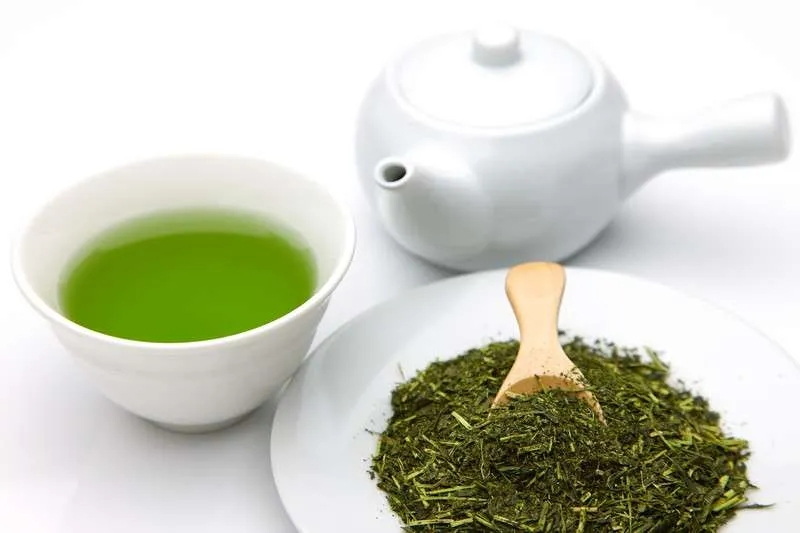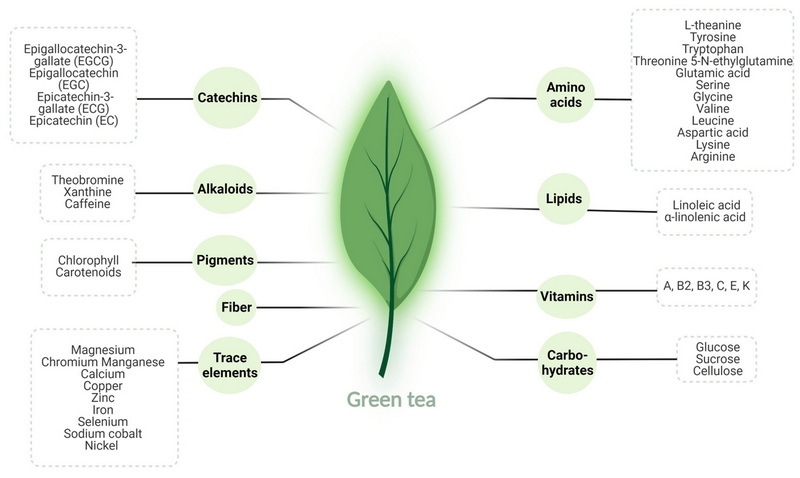Content Menu
● The Anti-inflammatory Properties of Green Tea Extract
>> Mechanisms of Action
>> Clinical Evidence Supporting Anti-inflammatory Effects
● Potential Pro-inflammatory Effects of Green Tea Extract
>> 1. High Doses and Concentrations
>> 2. Individual Variability
>> 3. Interaction with Medications
● Balancing the Benefits and Risks
● The Role of Green Tea Extract in Specific Conditions
>> 1. Respiratory Conditions
>> 2. Metabolic Syndrome
>> 3. Gut Health
● Historical Context of Green Tea Usage
● Nutritional Profile of Green Tea Extract
● The Science Behind Antioxidants
● Green Tea Extract's Impact on Weight Management
● Potential Side Effects Revisited
● Conclusion
● FAQ
>> 1. What are the primary benefits of green tea extract?
>> 2. Can green tea extract cause liver damage?
>> 3. How does green tea extract affect inflammation?
>> 4. Is it safe to take green tea extract with other medications?
>> 5. What is the recommended daily intake of green tea?
● Citations:
Green tea, derived from the leaves of Camellia sinensis, has gained immense popularity due to its numerous health benefits, primarily attributed to its rich content of polyphenols, especially epigallocatechin gallate (EGCG). While many studies highlight its anti-inflammatory properties, a growing body of research suggests that green tea extract (GTE) may also have pro-inflammatory effects under certain conditions. This article delves into the dual nature of green tea extract, examining both its beneficial and potentially harmful impacts on inflammation.

The Anti-inflammatory Properties of Green Tea Extract
Mechanisms of Action
Green tea extract is renowned for its potent antioxidants, which play a crucial role in combating oxidative stress and inflammation. The primary mechanisms through which GTE exerts its anti-inflammatory effects include:
- Reduction of Pro-inflammatory Cytokines: Studies have shown that GTE can significantly lower levels of pro-inflammatory cytokines such as tumor necrosis factor-alpha (TNF-α) and interleukin-6 (IL-6) in various models, including those simulating acute respiratory distress syndrome (ARDS) and asthma.
- Inhibition of Inflammatory Pathways: GTE has been found to inhibit key inflammatory pathways involving nuclear factor kappa B (NF-κB) and mitogen-activated protein kinases (MAPKs), which are critical in the inflammatory response.
- Oxidative Stress Mitigation: By scavenging reactive oxygen species (ROS), GTE helps reduce oxidative damage that can lead to chronic inflammation.
Clinical Evidence Supporting Anti-inflammatory Effects
Numerous clinical studies support the anti-inflammatory benefits of green tea extract:
- A study involving participants with metabolic syndrome demonstrated that GTE consumption reduced gut inflammation and improved blood sugar levels, suggesting a protective role against inflammation-related diseases.
- In asthma models, GTE was shown to decrease airway hyperresponsiveness and inflammatory cell counts, highlighting its therapeutic potential in respiratory conditions[1].
Potential Pro-inflammatory Effects of Green Tea Extract
Despite its well-documented benefits, there are circumstances where green tea extract may contribute to inflammation:
1. High Doses and Concentrations
Research indicates that excessive consumption of GTE can lead to adverse effects, including liver toxicity and increased inflammatory markers. For instance, individuals taking high doses of GTE supplements have reported elevated levels of liver enzymes, indicating potential liver damage[3][5].
2. Individual Variability
The inflammatory response to GTE can vary significantly among individuals based on genetic predispositions, existing health conditions, and concurrent medications. For example:
- Some studies suggest that in certain populations, particularly those with pre-existing liver conditions or metabolic disorders, GTE may exacerbate inflammatory responses rather than mitigate them[4].
3. Interaction with Medications
Green tea extract can interact with various medications, potentially leading to increased inflammation or decreased efficacy of treatments. For instance, it has been shown to affect the metabolism of certain drugs used for managing chronic diseases[10].

Balancing the Benefits and Risks
Given the dual nature of green tea extract's effects on inflammation, it is essential for consumers to approach its use with caution:
- Moderation is Key: Consuming moderate amounts of green tea (about 3–5 cups per day) is generally considered safe and beneficial for most individuals. However, high-dose supplements should be approached cautiously.
- Consultation with Healthcare Providers: Individuals with underlying health conditions or those taking medications should consult healthcare professionals before incorporating high doses of GTE into their regimen.
The Role of Green Tea Extract in Specific Conditions
1. Respiratory Conditions
Recent studies have highlighted the effectiveness of GTE in suppressing airway inflammation. In asthmatic models, GTE treatment led to a significant reduction in airway hyperresponsiveness and inflammatory cell counts[1]. The extract reduced levels of key cytokines involved in asthma exacerbation, demonstrating its potential as a therapeutic agent for respiratory diseases.
2. Metabolic Syndrome
GTE has also been shown to play a role in managing metabolic syndrome by reducing inflammation associated with obesity. It modulates pro-inflammatory markers such as TNF-α and IL-6 while promoting weight loss through increased fat oxidation[14]. This dual action not only helps reduce body weight but also alleviates the chronic low-grade inflammation often seen in obese individuals.
3. Gut Health
Emerging research indicates that green tea extract may benefit gut health by reducing gut inflammation associated with conditions like irritable bowel syndrome (IBS) and inflammatory bowel disease (IBD). A study found that participants taking GTE experienced lower levels of inflammatory proteins in their stool compared to those on a placebo[8]. This suggests that GTE may help maintain gut integrity and reduce systemic inflammation stemming from gut dysbiosis.
Historical Context of Green Tea Usage
Green tea has been consumed for thousands of years in Asia for its medicinal properties. Traditional Chinese medicine often utilized it for various ailments ranging from headaches to digestive disorders. Its popularity has spread globally as scientific research began validating these traditional claims through rigorous studies highlighting its health benefits.
Nutritional Profile of Green Tea Extract
Green tea contains several bioactive compounds beyond EGCG that contribute to its health-promoting properties:
- Caffeine: Provides a mild stimulant effect which can enhance mental alertness but may cause anxiety or insomnia if consumed excessively.
- L-Theanine: An amino acid that promotes relaxation without drowsiness; it can counteract some stimulating effects of caffeine.
- Flavonoids: These compounds contribute to cardiovascular health by improving blood vessel function and reducing cholesterol levels.
The Science Behind Antioxidants
Antioxidants play a critical role in neutralizing free radicals—unstable molecules that can cause cellular damage leading to chronic diseases such as cancer and heart disease. The catechins found in green tea are particularly effective at enhancing the body's antioxidant defenses by increasing the activity of antioxidant enzymes[15].
Green Tea Extract's Impact on Weight Management
Research shows that GTE can enhance fat oxidation during exercise while also suppressing appetite in some individuals[16]. This dual action makes it a popular ingredient in weight loss supplements; however, results vary significantly among individuals based on lifestyle factors such as diet and physical activity levels.
Potential Side Effects Revisited
While moderate consumption is generally safe for most individuals, excessive intake can lead to side effects such as:
- Gastrointestinal Issues: Nausea or diarrhea may occur when consumed on an empty stomach or at high doses due to caffeine content.
- Nervousness or Insomnia: High caffeine levels may provoke anxiety or disrupt sleep patterns.
- Liver Toxicity: Rare cases have been reported where concentrated forms led to acute liver injury; monitoring liver function is advised when using high-dose supplements[9][12].
Conclusion
In conclusion, while green tea extract offers significant anti-inflammatory benefits through various biological mechanisms, it is not without risks. High doses can lead to pro-inflammatory responses and other health issues. Understanding individual health status and moderating intake can help maximize the benefits while minimizing potential adverse effects.
In summary, while green tea extract presents numerous health benefits primarily through its anti-inflammatory properties due to its rich polyphenol content—particularly EGCG—its potential pro-inflammatory effects cannot be overlooked when consumed excessively or without proper medical guidance. Individuals should consider their unique health profiles when integrating GTE into their diets.

FAQ
1. What are the primary benefits of green tea extract?
Green tea extract is known for its antioxidant properties, which help reduce oxidative stress and inflammation. It may also support weight loss, improve heart health, and enhance brain function.
2. Can green tea extract cause liver damage?
Yes, high doses of green tea extract have been associated with liver toxicity in some individuals. It is crucial to use it in moderation and consult a healthcare provider if you have liver issues.
3. How does green tea extract affect inflammation?
Green tea extract generally reduces inflammation by lowering pro-inflammatory cytokines and inhibiting inflammatory pathways. However, excessive intake may lead to increased inflammation in some cases.
4. Is it safe to take green tea extract with other medications?
Green tea extract can interact with certain medications, potentially affecting their efficacy or increasing side effects. Always consult a healthcare provider before combining supplements with prescribed drugs.
5. What is the recommended daily intake of green tea?
Moderate consumption of 3–5 cups per day is recommended for most people to enjoy the health benefits without significant risks.
Citations:
[1] https://www.frontiersin.org/journals/immunology/articles/10.3389/fimmu.2024.1362404/full
[2] https://www.ajmb.org/Article?id=60567
[3] https://www.webmd.com/vitamins/ai/ingredientmono-960/green-tea
[4] https://www.healthline.com/nutrition/10-benefits-of-green-tea-extract
[5] https://www.rutgers.edu/news/green-tea-extract-may-harm-liver-people-certain-genetic-variations
[6] https://senchateabar.com/blogs/blog/green-tea-side-effects
[7] https://pmc.ncbi.nlm.nih.gov/articles/PMC11223924/
[8] https://www.healthline.com/health-news/green-tea-extract-may-help-reduce-blood-sugar-and-gut-inflammation
[9] https://pmc.ncbi.nlm.nih.gov/articles/PMC3746392/
[10] https://www.webmd.com/drugs/2/drug-76714/green-tea-leaf-extract-oral/details
[11] https://www.cambridge.org/core/journals/british-journal-of-nutrition/article/effects-of-green-tea-catechins-on-the-proinflammatory-response-after-haemorrhageresuscitation-in-rats/D36E14F0CB9C01D8CA9D77E6E3CD9472
[12] https://www.medicalnewstoday.com/articles/269538
[13] https://www.frontiersin.org/journals/nutrition/articles/10.3389/fnut.2022.1084455/full
[14] https://onlinelibrary.wiley.com/doi/10.1155/2013/635470
[15] https://www.healthline.com/nutrition/10-benefits-of-green-tea-extract
[16] https://onlinelibrary.wiley.com/doi/10.1002/mnfr.202300792
[17] https://bpspubs.onlinelibrary.wiley.com/doi/10.1111/bcp.14176
[18] https://www.urmc.rochester.edu/encyclopedia/content?contenttypeid=19&contentid=greenteaextract
[19] https://www.nccih.nih.gov/health/green-tea
[20] https://www.mountsinai.org/health-library/herb/green-tea
[21] https://health.clevelandclinic.org/green-tea-health-benefits
[22] https://hsph.harvard.edu/news/green-tea-healthy-habit/
[23] https://www.vumc.org/poison-control/toxicology-question-week/march-12-2021-what-are-adverse-effects-green-tea-extract
[24] https://health.clevelandclinic.org/green-tea-extract-a-better-way-to-boost-energy-or-not
[25] https://www.webmd.com/vitamins/ai/ingredientmono-960/green-tea
[26] https://pubmed.ncbi.nlm.nih.gov/32095935/
[27] https://pmc.ncbi.nlm.nih.gov/articles/PMC7098875/
[28] https://www.healthline.com/health/benefits-of-green-tea-for-skin
[29] https://pmc.ncbi.nlm.nih.gov/articles/PMC6412948/






























